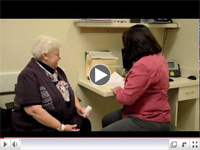Patient Stories
Outsmarting Cancer: Targeted Drugs Fight Lung Cancer

When Wilmington resident Joan O’Beirne, 68, started experiencing shortness of breath during her daily activities, she had no idea what could be causing it or that she was about to become part of a pioneering research study.
A widow with three grown children, O’Beirne has always been active and healthy, never smoking, playing tennis, and more recently watching her grandchildren every afternoon. When she noticed her shortness of breath, she consulted her primary care doctor who sent her to a lung specialist. Her early tests were inconclusive; she showed no sign of chronic obstructive pulmonary disease.
Seeking an answer, O’Beirne’s doctors ordered additional testing for cardiac disease and blood clots as well as a CT scan of her lungs. Finally, the CT showed scar tissue in the upper left lobe of her lung that a radiologist suspected might be a sign of cancer. A PET scan confirmed active cancer cells and she was sent to a lung surgeon for a biopsy to determine the extent of her cancer.

Joan O'Beirne describes her experience in this video
After a surgeon advised that her tumor would require a surgical biopsy—a procedure that increased the possibility of spreading the cancer—O’Beirne sought a second opinion. She met with Massachusetts General Hospital and North Shore Medical Center thoracic surgeon and lung specialist, Dean Donahue, M.D. With O’Beirne as an active member of her own care team, she decided to first have Dr. Donahue and the interventional radiologist perform a needle biopsy and send the sample to pathology for staging.
"With reassurance from Dr. Donahue, I felt completely comfortable with this approach," said O'Beirne.
O’Beirne’s biopsy confirmed Stage 2A cancer and Dr. Donahue then performed surgery to remove the upper lobe of her left lung. “After the surgery, I thought I would be fine,” said O’Beirne. “I was surprised to learn that chemotherapy decreases the chance that my cancer will return from 50 percent to about 35 to 45 percent. So I opted for the treatment.” She had chemotherapy at the Mass General/ North Shore Cancer Center, under the care of medical oncologist Rachel Rosovsky,M.D.
In recent years, researchers have been able to pinpoint, with greater accuracy than ever before, the exact genetic abnormalities in certain cancers that turn healthy cells into cancerous ones. In 2004, physician researchers from the Massachusetts General Hospital Cancer Center were the first to identify that a mutation in the epidermal growth-factor receptor (EGFR) was responsible for 10 percent of lung cancers —and 50 percent of those in non-smokers.
O’Beirne’s biopsy confirmed Stage 2A cancer and Dr. Donahue then performed surgery to remove the upper lobe of her left lung. “After the surgery, I thought I would be fine,” said O’Beirne. “I was surprised to learn that chemotherapy decreases the chance that my cancer will return from 50 percent to about 35 to 45 percent. So I opted for the treatment.” She had chemotherapy at the Mass General/ North Shore Cancer Center, under the care of medical oncologist Rachel Rosovsky,M.D.
In recent years, researchers have been able to pinpoint, with greater accuracy than ever before, the exact genetic abnormalities in certain cancers that turn healthy cells into cancerous ones. In 2004, physician researchers from the Massachusetts General Hospital Cancer Center were the first to identify that a mutation in the epidermal growth-factor receptor (EGFR) was responsible for 10 percent of lung cancers —and 50 percent of those in non-smokers.
Today, patients at the Mass General/ North Shore Cancer Center have their tumors screened for many types of cancer to determine their genotype, or genetic “fingerprint.” This genetic intelligence is then used to match the appropriate “smart drug” that is specifically crafted to interrupt the cancer-causing mechanism, with minimal side effects, to the specific genetic mutation.
O’Beirne is one of many patients who is benefitting from the comprehensive care and world-class research provided at the Mass General/North Shore Cancer Center. Genotyping revealed that her cancer was caused by the EGFR mutation. She is now enrolled in a clinical research trial evaluating the effectiveness of an existing EGFR-mutation “smart drug” that had previously proven effective in shrinking tumors in patients with advanced metastatic cancer. In O’Beirne’s trial, researchers are evaluating whether the drug—Tarceva— can prevent the recurrence of lung cancer in patients at an earlier stage of the disease.
“I feel so fortunate to be part of this research. I only have to take one pill every day for two years,” said O’Beirne. “I can’t believe this little pill might be able to prevent my cancer from coming back.”
“I’m so grateful for the wonderful care I’ve received at the Mass General/ North Shore Cancer Center,” said O’Beirne. “We’re so lucky to have access to such amazing surgeons and cutting-edge treatments and research so close to home."
“I’m so grateful for the wonderful care I’ve received at the Mass General/ North Shore Cancer Center,” said O’Beirne. “We’re so lucky to have access to such amazing surgeons and cutting-edge treatments and research so close to home."

